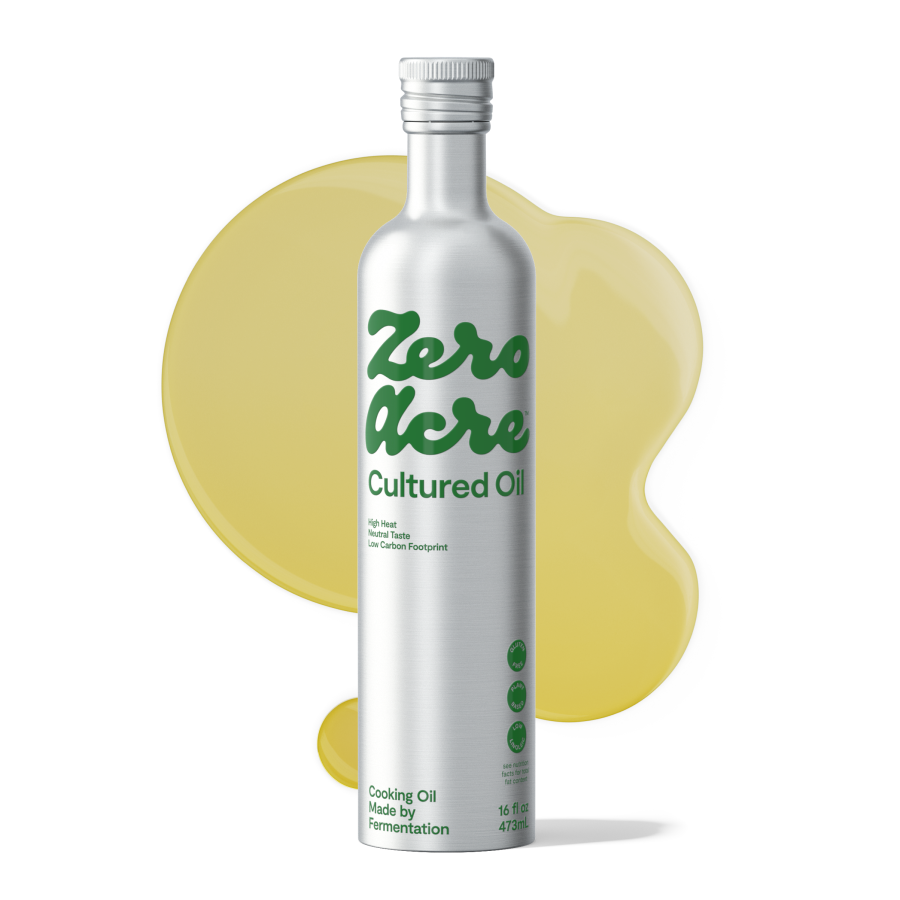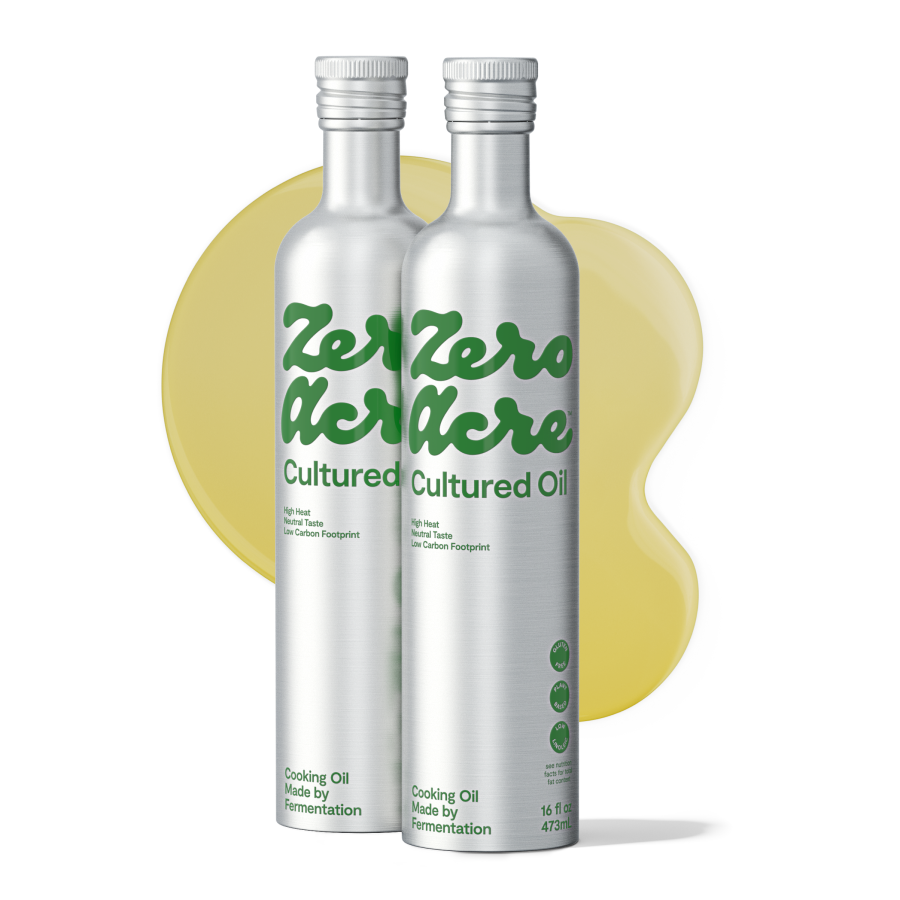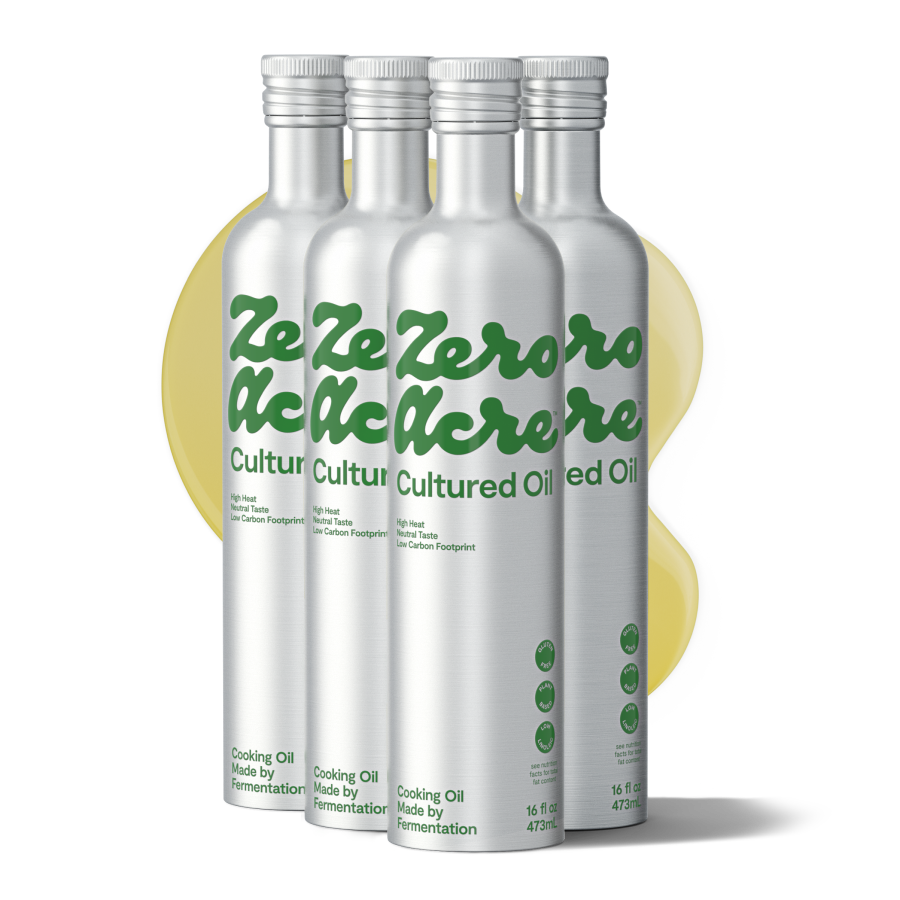WRITTEN BY: Jeff Nobbs
Highlights
Vegetable oils have been linked to obesity, heart disease, cancer, diabetes, dementia, and other chronic diseases and are also leading drivers of mass deforestation, biodiversity loss, and climate change.
Zero Acre oil is cooking oil made by fermentation. It’s sky-high (over 90%) in heart-healthy and heat-stable monounsaturated fat, extremely low (less than 3%) in omega-6 linoleic acid, and beats out other cooking oils in head-to-head heat stability tests.
Zero Acre oil uses 87% less land than canola oil, emits 86% less greenhouse gas than soybean oil, and uses 99% less water than olive oil.
Zero Acre oil can be used for everything from salad dressings to stir-fries with a clean neutral taste and high smoke point.
Zero Acre oil is part of a larger vision of healthy, sustainable, affordable oils and fats for home cooks, restaurants, and packaged foods. The online launch of Zero Acre oil is the first step toward a future free of destructive vegetable oils.
Introducing Zero Acre Oil
Zero Acre oil is a new type of cooking oil made by fermentation. We call it the “all-purpose cooking oil with a purpose” because we’re on a mission to improve human and planetary health by eliminating destructive vegetable oils from the food system.
Vegetable oils, also known as seed oils, are bad news for both our bodies and our environment. As we’ve detailed previously, these oils have been linked to obesity, heart disease, cancer, diabetes, dementia, and other chronic diseases. They are also leading drivers of mass deforestation, biodiversity loss, and climate change. The problem is, that they’re in nearly everything we eat, make up 20% of our daily calories, and are now the most consumed food in the world after rice and wheat [*].
To increase our years of happy, healthy life and to slow down the destruction inflicted on the environment by our food system, we want to give the world an oil change. We think the best way to do that is by bringing products to market that can displace vegetable oils at scale by being better than vegetable oils. That means creating products that aren't just better for our health and planet but also better for our taste buds, chefs and home cooks, and eventually better for our wallets.
But it’s not enough to create a cooking oil for those who meticulously optimize their health or only seek the most sustainable solutions. At Zero Acre, we want to develop solutions for anyone who simply wants the best-tasting, best-performing, most affordable products on the market.
Ideally, buying what’s better for our planet and collective health aligns with the decision to buy what’s better for each of us as individuals. That alignment is how impactful change happens quickly and at scale.
Our first step toward displacing harmful vegetable oils is the launch of Zero Acre oil, which is better than conventional vegetable oils in pretty much every way. There no longer needs to be a tradeoff between health, sustainability, and culinary performance.
How Zero Acre Oil is Made
Before jumping into all the benefits of Zero Acre oil, you may be wondering how it is made. In short, Zero Acre oil is made by fermentation. What does that mean?
Fermentation is the original culinary art after fire. It describes the process of microbial communities, or "cultures," converting natural sugars like those found in wheat, barley, milk, and grapes into entirely new foods like bread, beer, yogurt, and wine.
Just as there are sourdough and wine cultures, there are also oil cultures, which convert natural plant sugars into the healthy, delicious fats that make up Zero Acre oil.
The process starts with sunlight, which plants like sugarcane photosynthesize to store abundant energy as sugar. To make Zero Acre oil, that raw sugar from sugarcane is fed to an oil culture, which efficiently produces healthy oil via fermentation. Then, the oil is pressed, separated from the culture, filtered, bottled, and shipped to you.

Learn more about how Zero Acre oil is made.
Health Benefits of Zero Acre Oil
We are what we eat. All cells in our bodies, from heart and brain cells to eye and skin cells, are made up of proteins, lipids (fats), and carbohydrates. And those molecules come from only one source: our diets. The foods we choose to eat are, therefore, an essential part of how healthy we are on paper, how we feel, how we look, and ultimately, how long we live.
Unfortunately, our health is trending in the wrong direction. Six in 10 American adults have a chronic disease (up from 7.5% in 1935), over 40% are obese, and our healthy life expectancy is decreasing for the first time in our recorded history [*,*,*].
The biggest change in our diet since chronic disease and obesity rates started climbing is the increasing consumption of vegetable oils, which now make up 20% of our calories and have been linked to obesity, heart disease, cancer, diabetes, neurodegenerative disease, and more [*,*,*,*,*].
In order to replace vegetable oils at scale, it’s imperative to have an alternative that is a one-to-one replacement for vegetable oils, tastes great, and does not damage our health. That means:
More of the good fats and less of the bad fats that have been linked to disease and weight gain
A high oxidative stability and smoke point to prevent harmful free radicals and toxin formation
Transparency to ensure purity, quality, and authenticity
Zero Acre oil hits every one of these requirements with:
High levels (over 90%) of heart-healthy and heat-stable monounsaturated fat
Extremely low levels of inflammatory omega-6 linoleic acid
The highest oxidative stability of any major cooking oil
A high smoke point of 485ºF
An unprecedented level of traceability and transparency

To demonstrate the stability of Zero Acre oil under high heat, it was put to the test against other major cooking oils. When most oils are put under heat, they quickly degrade and oxidize, forming harmful oxidation products like toxic aldehydes. However, third-party cooking tests show that Zero Acre oil results in 50-75% fewer aldehydes when cooked, whether for only a few minutes or for an hour.
Learn more about the health impact of switching to Zero Acre oil.
Sustainability of Zero Acre oil
Vegetable oils are leading drivers of deforestation, biodiversity loss, and greenhouse gas emissions.
Two of the top three global drivers of deforestation and biodiversity loss are vegetable oil crops (soy and palm oil). Palm oil expansion alone could affect over half of the world’s threatened mammals and two-thirds of threatened birds globally [*].
The land use change associated with most vegetable oil crops is part of what contributes to their large carbon footprint. Four of the five most greenhouse gas-emitting crops are vegetable oils (palm, soy, canola, and sunflower oil).
Compared to vegetable oil, Zero Acre oil has a tiny environmental footprint, requiring 90% less land, 83% less water, and resulting in 86% fewer greenhouse gas emissions:
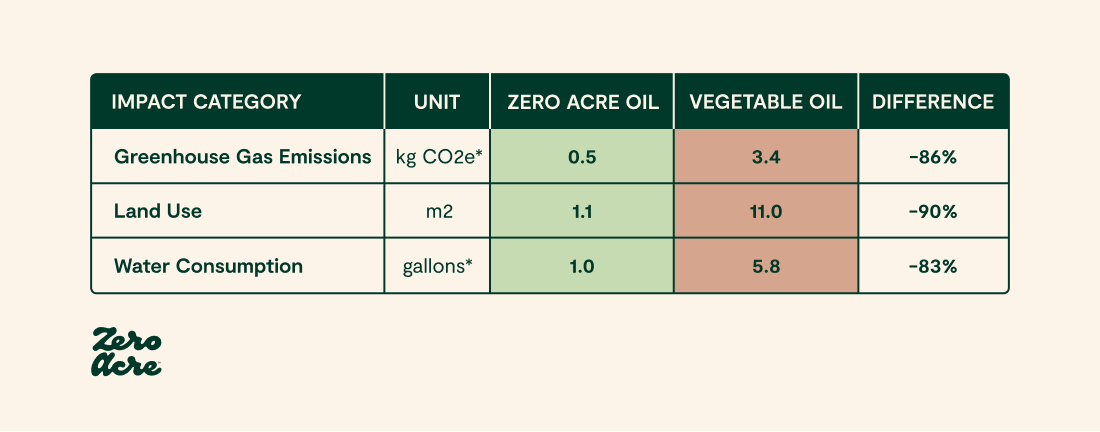
* per kg crude oil compared to soybean oil, based on third party LCA, in accordance with ISO 1404/44 standards. Includes land use change.
Some other cooking oils require significantly more water and land than conventional vegetable oils like soybean oil, and have a very high negative impact on biodiversity. For example, Zero Acre oil uses 300 times less water and 17 times less land than olive oil.
If just 5% of vegetable oil in the United States were replaced with Zero Acre oil, we would save 3.1 million acres of land, 3.6 million metric tons of CO2-eq, and 56.9 billion gallons of water every year, not to mention countless lives.
When we put it all together, no other oil comes close to Zero Acre oil’s small environmental footprint, health benefits, and versatility.
The best cooking oils for conserving land and biodiversity:
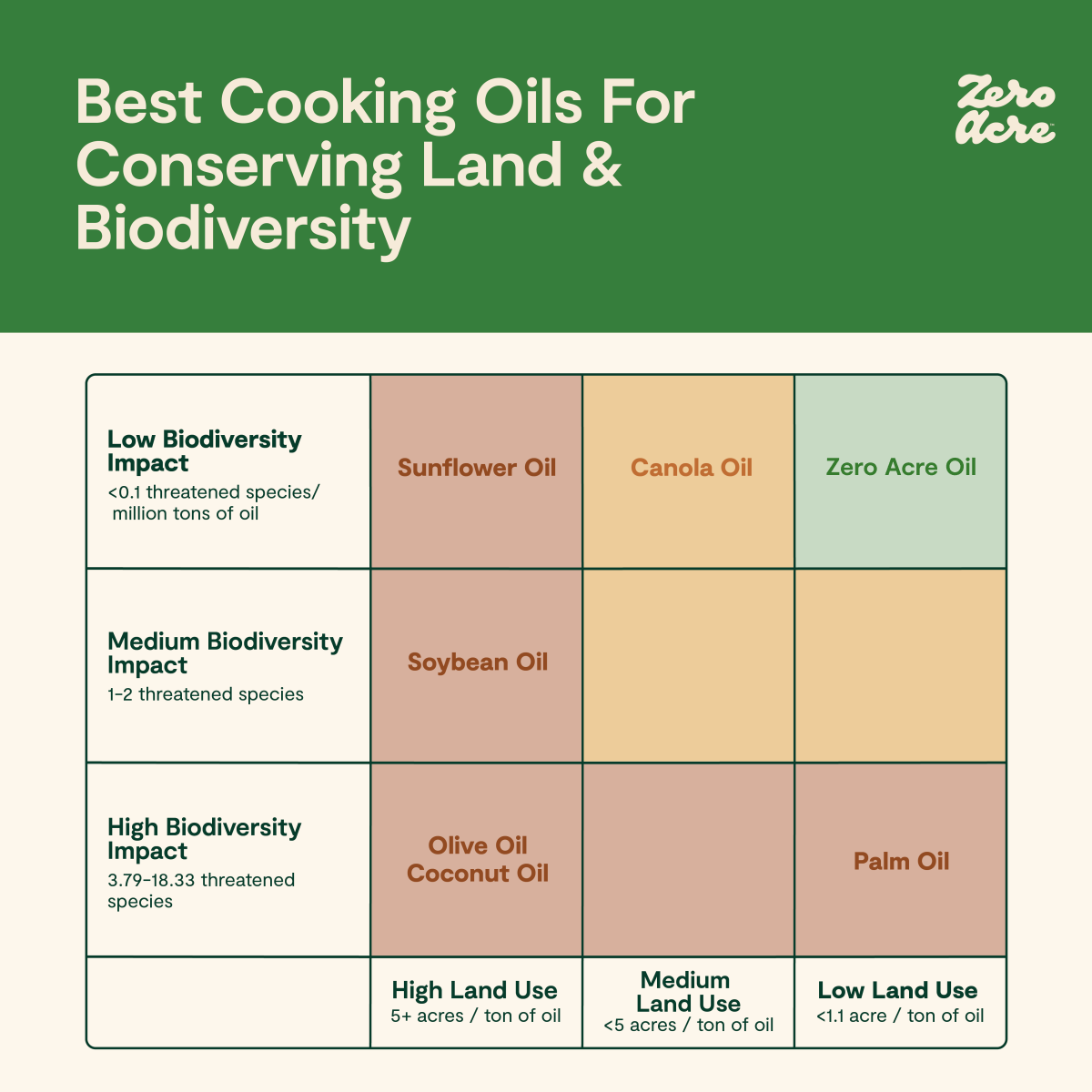
The best cooking oils for minimizing greenhouse gas emissions and water use:

The best oils for healthy cooking:
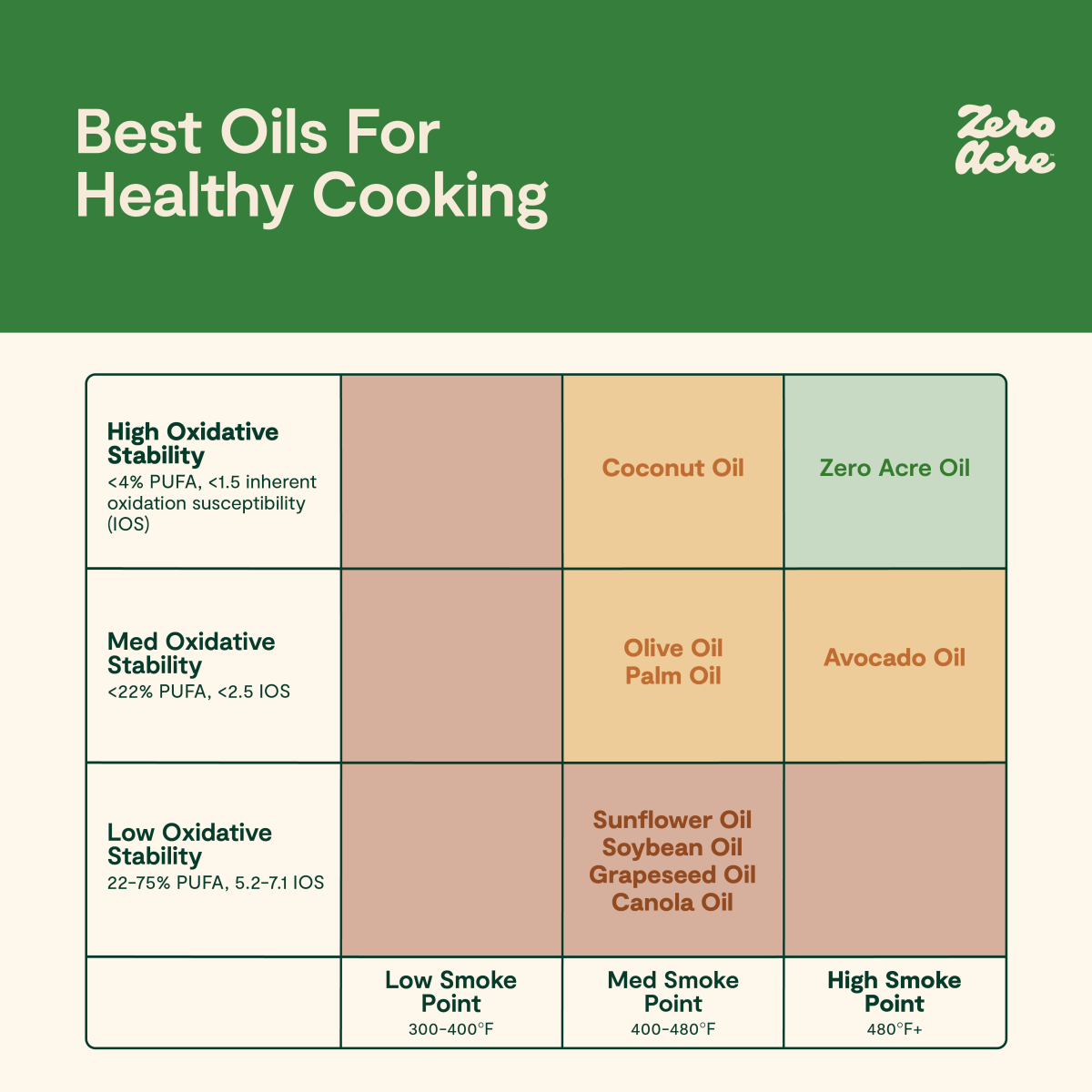
The best overall cooking oils for healthy cooking and a low environmental footprint:

Learn more about the sustainability impact of switching to Zero Acre oil.
Culinary Benefits of Zero Acre Oil
The health and sustainability benefits of Zero Acre oil mean nothing if no one buys it because it doesn’t taste good, perform well in the kitchen, and meet consumers where they are. Zero Acre oil must be a one-to-one replacement for harmful vegetable oil, and be as good or better than vegetable oil across a number of uses:
High-Heat Cooking

Zero Acre oil has a high smoke point of up to 485ºF. Only avocado oil has a similarly high smoke point. While oxidative stability is more reflective of the health impact of cooking an oil at high heat, smoke point still matters when it comes to cooking foods at high temperatures. “Smoke point” refers to the temperature at which the oil starts smoking, as a result of impurities (other compounds and materials in the oil) burning, which can result in undesirable flavors, acrolein, and a smoky kitchen.
Pouring, Dressing, Drizzling

Different types of fats have different physical properties.
Saturated fats are stable but typically solid at room temperature and, therefore, would not result in oils that can replace conventional cooking oils. You can't make a salad dressing with coconut oil or butter.
Polyunsaturated fats are liquid at room temperature, but are very unstable and more easily oxidize, making them potentially very harmful for human health, especially when heated.
Enter monounsaturated fats, which are just about as stable as saturated fats, while still remaining liquid at room temperature and colder. Monounsaturated fats are what make up half of beef fat and two-thirds of olive and avocado fat.
Because Zero Acre oil has over 90% monounsaturated fat, and less than 4% polyunsaturated fat, it is on par with solid fats when it comes to oxidative stability, while remaining liquid at colder temperatures — perfect for dressing and drizzling.
In fact, Zero Acre oil even remains liquid while in the fridge, which is an important characteristic for both restaurants and home cooks. It means you can make a salad dressing with Zero Acre oil and keep it in the fridge without the dressing clumping up and turning solid like an olive oil or avocado oil dressing.
While many restaurant and at-home cooks turn to olive oil for dressings and oil finishing, many restaurants are actually using an “olive oil blend,” which is typically 80% canola oil with a little bit of olive oil for flavor. Canola oil stays liquid in the fridge so restaurants can make dressings and marinades that last several days without having to pre-thaw the dressing each day to return to a pourable liquid state. As for at-home cooks? Previous reports have estimated that up to 75-80% of extra virgin olive oils on U.S. grocery store shelves may be mislabeled and adulterated with cheaper seed oils like canola [*].
In our mission to give the world an oil change, Zero Acre oil’s ability to stay liquid at a variety of temperatures is vital to its versatility. It means the oil can be used to dress, drizzle, brush, and spray, and can be used at scale in restaurants and in packaged foods, where manufacturers and restaurant operators expect a liquid oil to stay liquid. Zero Acre oil gives restaurants and home cooks alike the ability to use a liquid oil without all the linoleic acid and polyunsaturated fats that oxidize easily. Zero Acre oil is our first step toward a food system that doesn't do so much harm, without sacrificing the foods we love.
Great-Tasting Food

For many consumers, taste is the most important quality of any food. In a cooking oil, it’s important that taste is not a deterrent. When oils and fats oxidize, they become rancid, producing an unpleasant taste and odor [*]. Thus, oils that are oxidatively stable are least likely to become rancid and least likely to produce unpleasant tastes.
Certain oils, such as olive oil and coconut oil, have strong flavors that are appealing to some, unappetizing to others, or not appropriate for certain cooking applications. For instance, most baked goods take on the strong “green” or “grassy” flavors of olive oil, while coconut oil can overwhelm the more subtle flavors of a dish.
Although fermentation is often associated with the strong flavors of sauerkraut, kimchi, and kombucha, Zero Acre oil has a clean, neutral taste that some describe as lightly buttery. The flavor profile of Zero Acre oil is part of what makes it so versatile, lending itself well to a variety of cooking applications, from refrigerated salad dressings to high-heat stir-fries and your favorite baked goods.
Learn more about how fermentation is used to make our favorite foods.
Cost of Zero Acre Oil
In our mission to give the world an oil change, you may be wondering why we’re starting with a premium cooking oil sold to consumers on the Internet. To understand why a direct-to-consumer cooking oil matters, it's important to understand how it fits into our larger vision.
Almost any new way of doing things has high unit costs before it can be optimized and this is no less true for cooking oils. The strategy for Zero Acre Farms is to enter at the high end of the consumer market, where customers are prepared to pay a premium for a better product and cooking experience, and then bring down the cost as quickly as possible as we scale to higher volumes.
Soon, we expect that the cost to food manufacturers who want to use Zero Acre oil in their products will be at least 80% lower than the current retail price of Zero Acre oil, and will continue to be even more affordable for restaurants and other food customers as we continue to scale.
One of the benefits of being a mission-oriented company with a long-term vision is that free cash flows go back into R&D to bring down production costs and bring new products to the market that further build scale, and thus further bring down costs.
When someone buys Zero Acre oil today, they are actually helping pay for the research and development of much more affordable, healthy, and sustainable oils and fats to be used in packaged foods and fast food restaurants in the future.
While being as cost-effective as soybean oil and palm oil is our long-term goal, it is also important to recognize that for many people, there is no price "low enough" to justify the purchase of unhealthy and/or unsustainable products.
For example, many people won't drink Coca-Cola, no matter how cheap it is. Similarly, the price of cigarettes does not dictate whether most people smoke. In our marketing efforts, we focus on education to nudge consumers toward paying for products that are better for them; or rather, not supporting unhealthy, unsustainable products just because they're cheap.
Another path to lower costs is regulation. Like sodas and sugar-sweetened beverages, vegetable oils might be one of the most expensive food products on the shelf if their negative health and environmental externalities were reflected in the price. If soda taxes work to lower consumption, can we do the same with vegetable oil?
By way of example, the U.S. spent $4.1 trillion on healthcare costs in 2020 [*]; if even 1% of those healthcare costs were attributed to the excess consumption of vegetable oils like soybean oil (which on its own accounted for 14% of American calories in 2019), the cost of soybean oil would double!
Further, we are already seeing massive price increases in vegetable oils as a result of a delicate supply chain and volatile weather conditions [*]. As the price of vegetable oils increase, Zero Acre oil becomes comparatively less expensive.
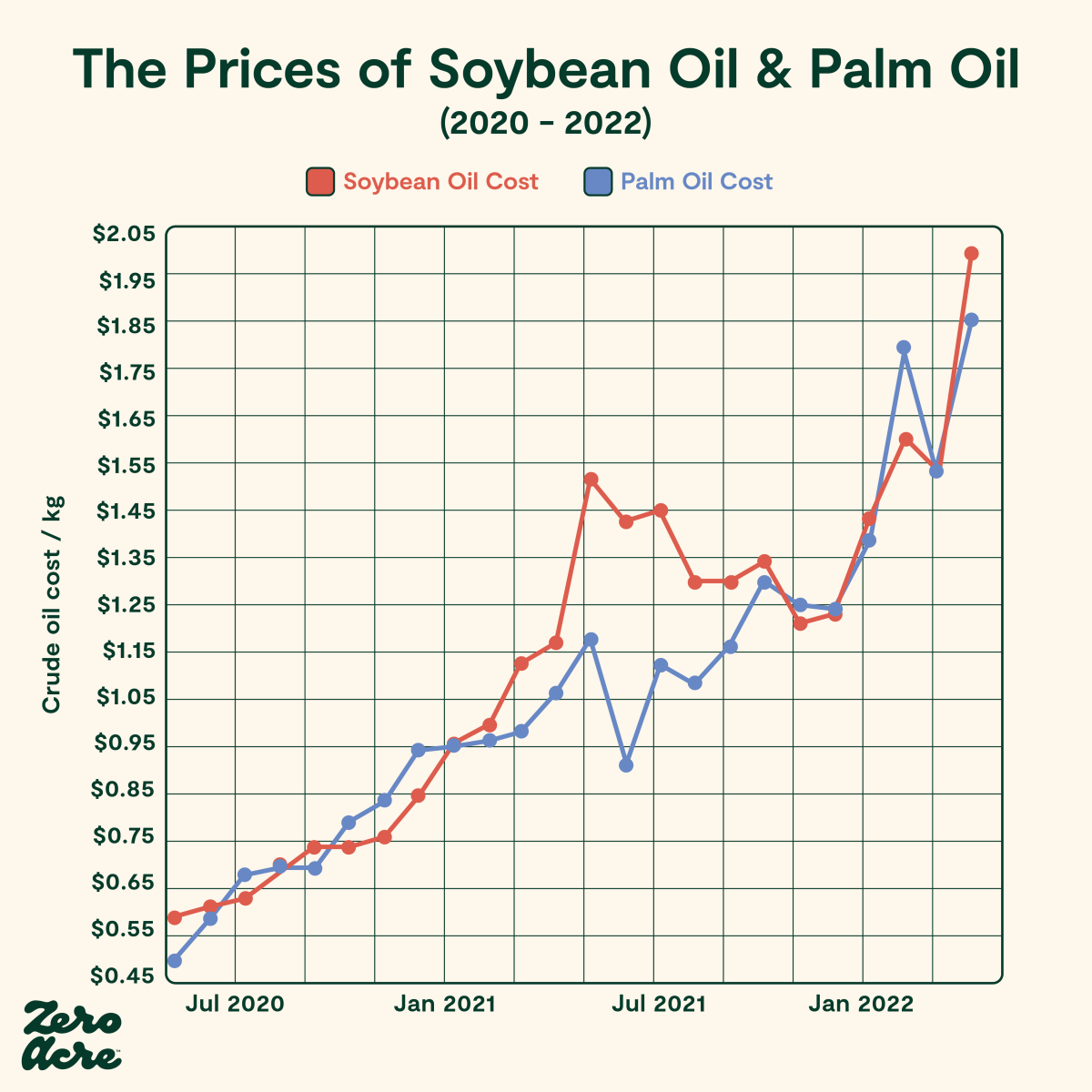
Price of soybean oil (red) and palm oil (blue) over the last two years.
Zero Acre oil would likely be the least expensive cooking oil on the market, if the price of cooking oils reflected their cost to our health and society. But even without internalizing these negative externalities, the price of Zero Acre oil will come down as a result of increased volume. Until then, we think the extra expense is worth every penny.
Safety of Zero Acre Oil
With any new food, there are often questions about its safety. To address these concerns upfront: there is nothing new in Zero Acre oil. The fats found in Zero Acre oil are the same fats that humans have been eating for the entirety of our evolution.
Similarly, fermentation has been a method of food production since antiquity. It is estimated that one-third of the food in the world today is a result of fermentation [*]. Just like making cheese, beer, bread, or wine, fermentation can also produce healthy fats, like those found in Zero Acre oil.
Read more about fermentation and how Zero Acre oil is made.
Whenever we think we’ve outsmarted nature, it usually backfires. This was the case with trans fats, partially hydrogenated oils, Crisco, and Olestra. Those fats and products introduced entirely new compounds to the human diet in hopes that they would fool our biology into digesting them. Those experiments didn’t end well. Partially hydrogenated oils and the trans fats they contain are thought to have caused hundreds of thousands of deaths per year while in widespread use.
We strongly believe that the key to moving forward is in looking back.
Humans were just fine for hundreds of thousands of years relying mostly on monounsaturated fat, saturated fat (primarily stearic and palmitic acid), and a little bit of polyunsaturated fat (a tiny amount of linoleic acid, as well as omega-3s). There is no need to invent new fats; nature already provides us with the healthiest fats for humans.
Monounsaturated fats as well as saturated fats like stearic acid, have been shown in study after study to improve health outcomes in humans [*,*,*,*,*,*]. The oil cultures (microorganisms) responsible for making Zero Acre oil follow the same biological cues as any other organism that naturally makes fat, from cows and pigs to coconuts and olives. The primary difference is the size of the organism (microorganisms are a lot smaller than pigs), as well as how efficiently these organisms produce fats. Oil cultures can produce up to 90% of their weight in healthy fats in only a few days — an incredible process thanks to the efficiency of fermentation. Zero Acre oil is fully compliant with all U.S. Food and Drug Administration (FDA) regulations. The only ingredient added to Zero Acre oil is mixed tocopherols, a natural form of vitamin E, which serves as an antioxidant.
Read more about the health impact of switching to Zero Acre oil.
The Future of Zero Acre Farms
Zero Acre oil is part of a larger vision and a bigger picture. The future of Zero Acre Farms is not just a great cooking oil sold on the Internet. That is our first step toward the reason we're doing any of this at all — to give the world an oil change, to move the world away from destructive vegetable oils and toward healthier, more sustainable oils and fats.
As we grow, we aim to measure the success of our efforts based on chronic disease rates in the markets in which we operate, as well as rates of deforestation, land use, water consumption, biodiversity loss, and greenhouse emissions attributable to edible oils and fats.
Currently, in the U.S., between our food and healthcare system, we have it all backwards. We spend twice as much on healthcare as we do on food [*,*].
The more unhealthy our population is, largely as a result of poor diet, the more we pay for healthcare expenses and the less productive we are. Eventually, we'll be in a position where we pay more for healthcare than we generate in GDP (gross domestic product).
By definition, if we pull more resources from our healthcare systems (and other centralized systems) than the value we add to society, civilization will eventually collapse.
Unfortunately, it is a vicious cycle where poor diet leads to worse health (and thus increasing healthcare costs), making it more difficult for individuals to be productive, value-adding members of society. Furthermore, more money spent on healthcare means less money to spend on food, education, gym memberships, and other things that can promote good health, leading to a downward spiral.
According to some estimates, if healthcare spending continues to rise at its current pace, the United States will be insolvent (bankrupt) by 2035 [*]. Since 1970, healthcare expenditure has increased by an average of 8.4% per year while GDP has increased by an average of 6.1% per year. Our current path is, by definition, not sustainable.
Ninety percent of healthcare costs are attributable to chronic disease, and a leading cause of chronic disease is poor diet [*]. We must move away from foods that make us sick and contribute to increasing rates of chronic disease.
In addition to our healthcare system, our natural environment is also in trouble. In order to radically reduce our environmental footprint, changes must be made across a number of sectors and industries, including agriculture. Vegetable oils make up about one-fifth of our calories in the U.S., and shrinking the environmental burden of those calories by ~90% would be an important and significant step toward giving ourselves more time to transition to sustainable energy and agricultural systems.
Here's how we plan to do our part in preventing the collapse of our healthcare system and the environment:
Bring Zero Acre oil to the market to immediately have a positive impact on human health and reduce the environmental impact of the oils we cook with.
Start with online sales to increase production volume, increase awareness, and educate about the problem of destructive vegetable oils. Some of that education will push consumers toward consuming less oil altogether, or choosing a product that isn't Zero Acre oil. Some of the education will lead to more purchases of Zero Acre oil, increasing production volume.
As volume grows, our costs come down, allowing us to lower the price of Zero Acre oil and/or put more cash flow into R&D to develop lower-cost processes and even better products.
As Zero Acre oil becomes more affordable, more individuals and businesses are able to purchase it, increasing volume, and further decreasing costs.
With enough volume and more R&D, Zero Acre oil eventually matches or surpasses the affordability of vegetable oils for food businesses that reach the most people and can have the largest impact, such as fast food restaurants.
Our hope is that soon customers will be demanding that their favorite snacks and restaurants use healthier, more sustainable fats and oils. Some fraction of those requests and demands may lead to packaged food companies and restaurants switching from harmful vegetable oils to Zero Acre oil.
Another fraction may lead businesses to switching to other oils and fats that are a little bit healthier and a little bit more sustainable — for example, moving away from conflict palm oil to fair trade palm oil, or away from factory farm lard to regeneratively farmed animal fats. Those are wins as well. We hope to be the catalyst for change, but we don't have to profit from all of those changes.
Really, the only reason we care about profits is so that we can afford to continue catalyzing change, which means awareness, education, and R&D to make healthier and more sustainable oils and fats, and to make them more affordable. In order to hold ourselves to this standard, we incorporated as a Public Benefit Corporation in 2021. That means we have a legal responsibility to optimize not for profits, but for our plan to improve human and planetary health. The first big step of that plan starts now.

The World Needs an Oil Change
Zero Acre Farms is on a mission to remove destructive vegetable oils from the food system. Learn how vegetable oils are at the center of disease and environmental destruction, and how we plan to change that using the ancient art of fermentation.

Fermentation 101: How Zero Acre oil is Made
To understand how the magic of fermentation is used to produce bread, beer, cheese, and Zero Acre oil, it's helpful to first understand what fermentation is.
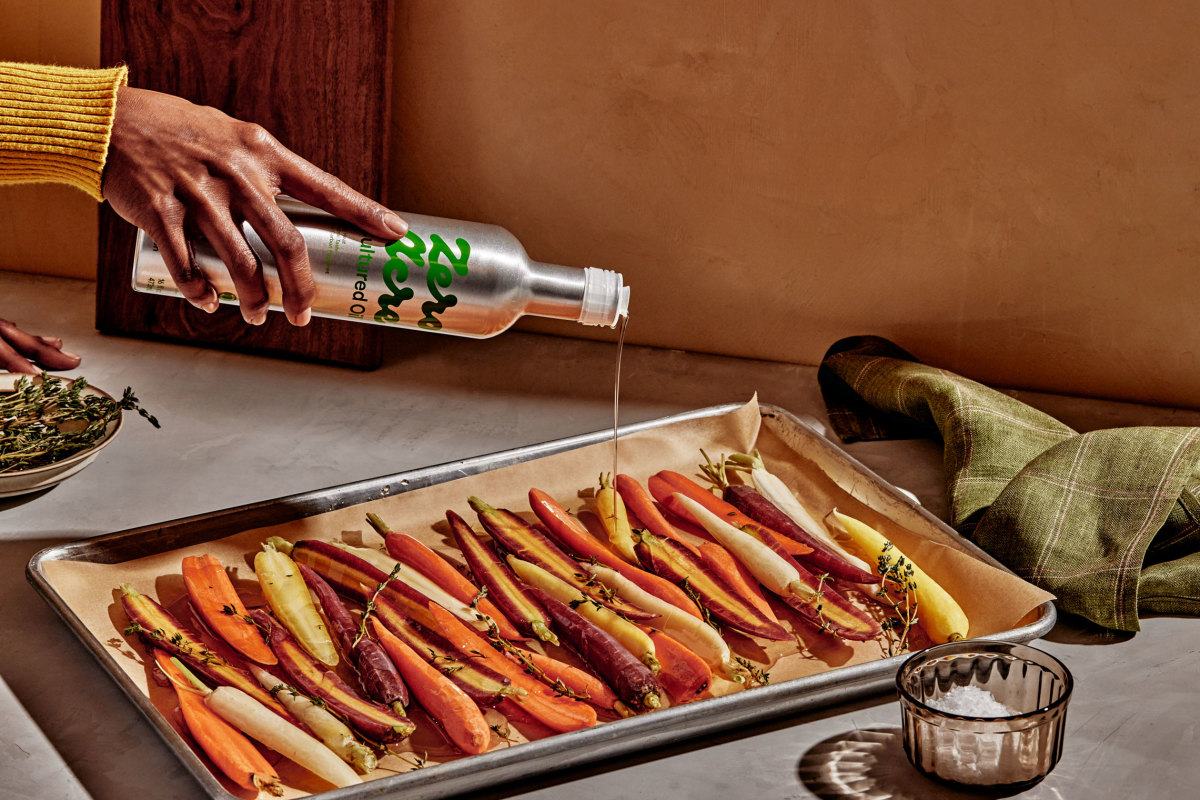
Zero Acre Oil Health Report
Zero Acre oil is the cooking oil the world's been waiting for. It’s low in linoleic acid, high in healthy fats, and can withstand high-heat cooking.
